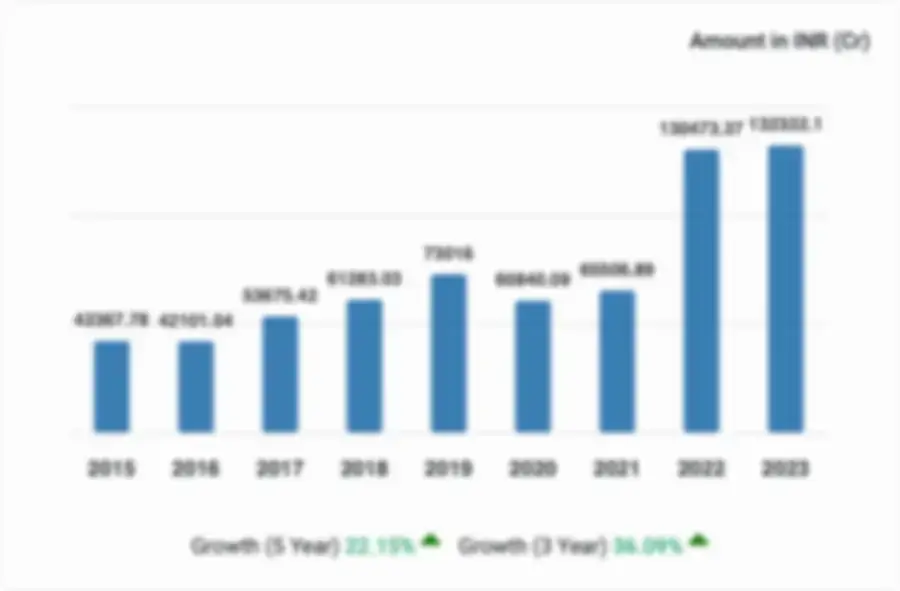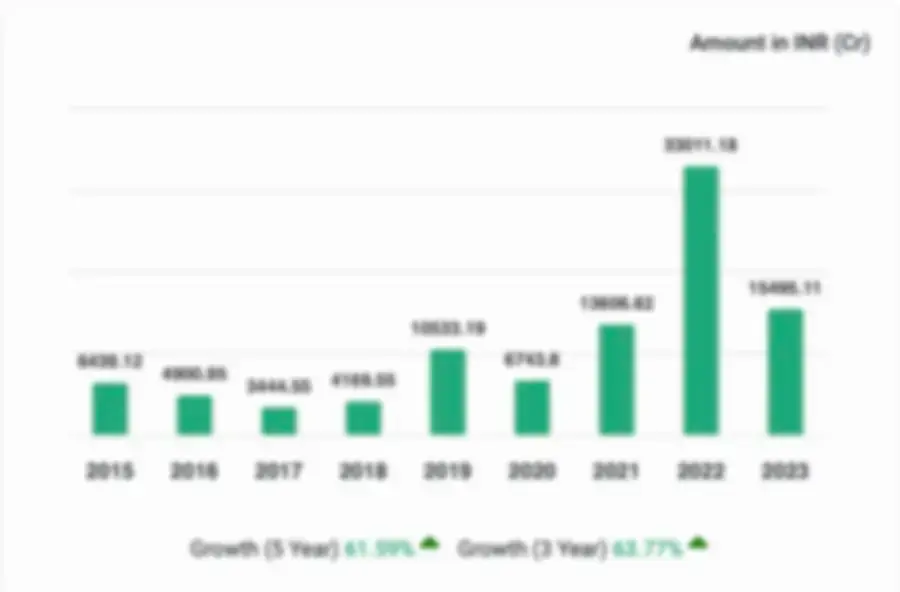

Sakura Autoparts India Profile
Key Indicators
- Authorised Capital ₹ 50.00 Cr
- Paid Up Capital ₹ 35.00 Cr
- Company Age 12 Year, 8 Months
- Last Filing with ROC 31 Mar 2024
- Open Charges ₹ 1.50 Cr
- Revenue Growth -11.34%
- Profit Growth 136.05%
- Ebitda 27.02%
- Net Worth 38.92%
- Total Assets -24.23%
About Sakura Autoparts India
Sakura Autoparts India Private Limited (SAIPL) is a leading Private Limited Indian Non-Government Company incorporated in India on 12 September 2012 and has a history of 12 years and eight months. Its registered office is in Kanchipuram, Tamil Nadu, India.
The Company is engaged in the Automotive Industry.
The Company's status is Active, and it has filed its Annual Returns and Financial Statements up until 31 March 2024. It's a company limited by shares with an authorized capital of Rs 50.00 Cr and a paid-up capital of Rs 35.00 Cr.
The company currently has active open charges totaling ₹1.50 Cr.
The Key Managerial Personnel (KMP) at Sakura Autoparts India Private Limited India is Little Bohra as COMPANY SECRETARY. Shinya Yamamoto, Ito Kazunori, and Toshinori Takai serve as directors at the Company.
Company Details
- Location
Kanchipuram, Tamil Nadu, India
- Telephone
+91-XXXXXXXXXX
- Email Address
- Website
- Social Media
Corporate Identity Details
- CIN/LLPIN
U35990TN2012PTC087602
- Company No.
087602
- Company Classification
Private Limited Indian Non-Government Company
- Incorporation Date
12 Sep 2012
- Date of AGM
04 Sep 2024
- Date of Balance Sheet
31 Mar 2024
- Listing Status
Unlisted
- ROC Code
Roc Chennai
Industry
Who are the key members and board of directors at Sakura Autoparts India?
Executive Team (2)
| Name | Designation | Appointment Date | Status |
|---|---|---|---|
| Shinya Yamamoto | Managing Director | 30-Sep-2022 | Current |
| Little Bohra | Company Secretary | 14-Jun-2019 | Current |
Board Members (2)
| Name | Designation | Appointment Date | Status |
|---|---|---|---|
| Ito Kazunori | Director | 14-Nov-2022 | Current |
| Toshinori Takai | Director | 27-Nov-2020 | Current |
Financial Performance of Sakura Autoparts India.
Sakura Autoparts India Private Limited, for the financial year ended 2023, experienced significant reduction in revenue, with a 11.34% decrease. The company also saw a substantial improvement in profitability, with a 136.05% increase in profit. The company's net worth Soared by an impressive increase of 38.92%.


- Key Matrics
- Balance Sheet
- Profit and Loss
- Cash Flow
- Ratios
| Metrics |
| (FY 2022) | (FY 2021) | (FY 2020) | (FY 2019) | ||
|---|---|---|---|---|---|---|---|
| Total Revenue |
| ||||||
| Revenue from Operations |
| ||||||
| Total Assets |
| ||||||
| Profit or Loss |
| ||||||
| Net Worth |
| ||||||
| EBITDA |
|
What is the Ownership and Shareholding Structure of Sakura Autoparts India?
In 2023, Sakura Autoparts India had a promoter holding of 40.00% and a public holding of 60.00%. Access key insights, ownership, including shareholding patterns, funding, foreign investors, KMP remuneration, group structure, and overseas investments.

Charges (Loans)
₹1.50 Cr
₹0
Charges Breakdown by Lending Institutions
- Hdfc Bank Limited : 1.50 Cr
Latest Charge Details
| Date | Lender | Amount | Status |
|---|---|---|---|
| 16 Jul 2024 | Hdfc Bank Limited | ₹1.50 Cr | Open |
How Many Employees Work at Sakura Autoparts India?
Sakura Autoparts India has a workforce of 377 employees as of Apr 07, 2024. Unlock access to detailed historical data on individuals associated with the company, including employment records, contributions to the Employees' Provident Fund Organization (EPFO), and other related insights.

Deals i

Gain comprehensive insights into the Deals and Valuation data of Sakura Autoparts India, offering detailed information on various transactions, including security allotment data. Explore the intricate details of financial agreements, mergers, acquisitions, divestitures, and strategic partnerships that have shaped Sakura Autoparts India's trajectory.
Rating

Access the credit rating data, providing valuable insights into the company's creditworthiness and financial stability. Explore assessments from leading credit rating agencies, evaluating factors such as debt obligations, liquidity, profitability, and overall financial health.
Alerts

Stay informed about regulatory alerts and litigation involving and associated companies. Receive timely updates on legal proceedings, regulatory changes, and compliance issues that may impact the company's operations, reputation, and financial performance. Monitor litigation involving subsidiaries, joint ventures, and other affiliated entities to assess potential risks and liabilities.
Latest Updates, News, and FAQs on Sakura Autoparts India
Recent activity within the organization
- Annual General Meeting
Sakura Autoparts India Private Limited last Annual general meeting of members was held on 04 Sep 2024 as per latest MCA records.
- Charges
A charge with Hdfc Bank Limited amounted to Rs. 1.50 Cr with Charge ID 100954540 was registered on 16 Jul 2024.
- Balance Sheet
Sakura Autoparts India Private Limited has filed its annual Financial statements for the year ended 31 Mar 2024 with Roc Chennai.
- Director Appointment
Ito Kazunori was appointed as a Director was appointed as a Director on 14 Nov 2022 & has been associated with this company since 2 years 6 months .
- Director Appointment
Shinya Yamamoto was appointed as a Managing Director was appointed as a Managing Director on 30 Sep 2022 & has been associated with this company since 2 years 7 months .
- Director Appointment
Toshinori Takai was appointed as a Director was appointed as a Director on 27 Nov 2020 & has been associated with this company since 4 years 5 months .
Frequently asked questions
What is the Incorporation or founding date of Sakura Autoparts India Private Limited?
Sakura Autoparts India Private Limited was incorporated on 12 Sep 2012.
What is authorized share capital and paid-up capital of Sakura Autoparts India Private Limited?
The authorized share capital of Sakura Autoparts India Private Limited is ₹ 50.00 Cr and paid-up capital is ₹ 35.00 Cr.
Who are the current board members & directors of Sakura Autoparts India Private Limited?
Currently 4 directors are associated with Sakura Autoparts India Private Limited.
- Shinya Yamamoto
- Ito Kazunori
- Little Heeralal Bohra
- Toshinori Takai
What is the registered address of Sakura Autoparts India Private Limited?
As per Ministry of Corporate Affairs (Mca), the registered address of Sakura Autoparts India Private Limited is No. 3 Sipcot Industrial Park Vallam Vadagal, Sriperumbudur India, Kancheepuram, Tamil Nadu, 631604.
What is the corporate identification number (CIN) and company number of Sakura Autoparts India Private Limited?
The corporate identification number (CIN) of Sakura Autoparts India Private Limited is U35990TN2012PTC087602 and the company number is 087602 as per Ministry of Corporate Affairs (MCA).
What is the official website of Sakura Autoparts India Private Limited?
The Official website of Sakura Autoparts India Private Limited is https://www.sakuraindia.co.in
What has been the recent revenue trend for Sakura Autoparts India Private Limited?
According to the financial reports for the fiscal year 2023, the revenue trend for Sakura Autoparts India Private Limited has fallen by -11.34%.
How many employees does Sakura Autoparts India Private Limited currently have?
As Per 2023 financial reports, 377 employees are currently employed by Sakura Autoparts India Private Limited.
What change has been observed in the net worth of Sakura Autoparts India Private Limited, and by what percentage?
The financial reports for the fiscal year 2023 indicates that The net worth of Sakura Autoparts India Private Limited has experienced an upsurge of 38.92%.
What are the total open charges for Sakura Autoparts India Private Limited?
As per the financial statements for fiscal Year 2023, The total open charges for Sakura Autoparts India Private Limited amount to ₹ 1.50 Cr.
When was the last Balance Sheet of Sakura Autoparts India Private Limited filed with the ROC?
The most recent Balance Sheet for Sakura Autoparts India Private Limited was filed with the ROC on 31 Mar 2024.
Search company & director profiles for free and gain access to critical business data.
- 3.1M+ Companies
- 15M+ Legal Cases
- 525K+ Credit Ratings
- 5.8M+ Directors & KMP
- 750K+ Regulatory Alerts
- 1.1M+ Companies' Financial Records
People also Viewed
SH
Shintaro HiranoDirectorTF
Takao FurugoriManaging DirectorKT
Kazuhisa TakaiDirectorHI
Hirohito ItoDirectorNN
Nao NonakaDirectorYA
Yoshiaki AmanoDirectorYI
Yuji IshizukaManaging DirectorTN
Tomoki NakajimaDirector
Similar Companies Based on Auto Parts & Components
 Ceat Limited Mumbai, Maharashtra, India
Ceat Limited Mumbai, Maharashtra, India Cummins India Limited Pune, Maharashtra, India
Cummins India Limited Pune, Maharashtra, India Tata Cummins Private Limited Pune, Maharashtra, India
Tata Cummins Private Limited Pune, Maharashtra, India Cummins Technologies India Private Limited Pune, Maharashtra, India
Cummins Technologies India Private Limited Pune, Maharashtra, India Mrf Limited Chennai, Tamil Nadu, India
Mrf Limited Chennai, Tamil Nadu, India Bosch Limited Bangaluru, Karnataka, India
Bosch Limited Bangaluru, Karnataka, India Balkrishna Industries Limited Aurangabad, Maharashtra, India
Balkrishna Industries Limited Aurangabad, Maharashtra, India Fiat India Automobiles Private Limited Pune, Maharashtra, India
Fiat India Automobiles Private Limited Pune, Maharashtra, India
